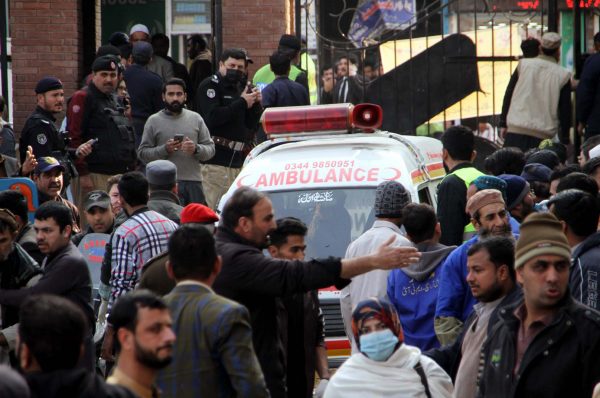Terrorist attacks in Pakistan peaked in 2013, averaging just under four attacks a day, with nearly 2700 total fatalities. The latest trends suggest that 2023 may be worse, with almost 200 terror-related incidents and at least 340 fatalities by March.
Is Pakistan reliving the scary spectre of 2013? It may be — the last quarter of 2022 set the tone for the ensuing months, with December ending off the year as the deadliest month for Pakistan’s security forces in over a decade. Around 282 military and police personnel were among the 973 total fatalities in 2022.
At the centre of this violence is a new terror triad. It comprises the Tehrik-e-Taliban Pakistan (TTP), the ethnic Baloch Liberation Army (BLA) and the Islamic State of Khorasan Province (ISKP), the regional chapter of ISIS.
One of the immediate explanations for the unprecedented spate of terrorism is the unilateral cancellation of a year-old ceasefire on 28 November 2022 by the TTP, which blamed the government for ‘breaching commitments’ and criticised Pakistani security forces for their actions across the Khyber Pakhtunkhwa and Balochistan provinces that straddle Afghanistan.
The TTP demands the restoration of the special status of seven border regions that were annulled in May 2018 and the release of dozens of its detained members. It also wants the Pakistani army out of former no-go areas, presumably to establish its own Islamic caliphate. Islamabad brushed these demands aside as ‘non-negotiable’.
Faced with a ramped-up crackdown since early 2021, the defunct TTP has retreated into safe havens in Afghanistan, especially once the Afghan Taliban swept back to power in August 2021. The TTP leadership, including their chief Noor Wali Mehsud, presently enjoy shelter and hospitality in Afghanistan.
The presence of top TTP leadership in Afghanistan and the freedom they enjoy has become a sore point in talks with the Afghan Taliban regime. Islamabad is demanding punitive action against the TTP for violence in Pakistan. In media interviews, Mehsud denied his group was using Afghan soil for attacks on targets outside Afghanistan but did not dispute that his militants have been rampaging in Pakistan.
Kabul appears reluctant to take direct conclusive action against the TTP for multiple reasons. The Khyber Pakhtunkhwa province is home to predominantly ethnic Pashtun tribes settled on both sides of the Pakistan–Afghanistan border and so is the TTP that draws its strength from the community in this region.
The Afghan Taliban, also a predominantly Pashtun group, boasts an ethnic and ideological affinity with the TTP. They partnered against the US-led NATO forces in Afghanistan during the two decades of the War on Terror. It is no surprise that once Pakistan began hunting down terrorists in the border regions, most of the TTP top brass relocated to safe havens in Afghanistan.
Geopolitical factors may also be contributing to terrorism. Against the backdrop of intense US–China rivalry, the Afghanistan-based East Turkestan Islamic Movement and the ISKP publicly avowed to hit Chinese interests in the region. The ISKP boasts hundreds of publications, including some recent books and magazines, that specifically focus on China and its regional interests.
Beijing considers these groups Western proxies out to hurt Chinese interests. It views their killing of several Chinese nationals in Pakistan, almost all of them working on the multi-billion-dollar China–Pakistan Economic Corridor — a flagship of the Belt and Road Initiative — in the same context. Beijing also questions why the United States revoked the designation of the East Turkestan Islamic Movement as a ‘terrorist organisation’ in November 2020, with Washington saying there was no credible evidence that the movement continues to exist.
An absence of cohesive civil–military action may also be a major contributing factor. It encourages the TTP to escalate their terror campaign, dubbed as ‘proxy terrorists’ by Pakistani officials.
Until early 2022, relentless military operations in the volatile border districts had been taking out scores of militants. As a result, terrorist violence decelerated in Pakistan by 85 per cent, according to private and Pakistan military estimates.
Critics attribute the resurgent violence by ISIS-linked ethnic Pashtun and Baloch terrorists and separatists to the Pakistani military’s involvement in national politics. In a televised speech on 27 November 2022, just days before his resignation, former Chief of Army Staff Qamar Javed Bajwa conceded that the military had been meddling in politics, despite a conscious decision in early 2021 to stop ‘unconstitutional interference’. Even after his retirement, Bajwa admitted to ‘managing’ Pakistani politicians, journalists and foreign affairs.
Even more critical than Bajwa’s admission is the unprecedented political and economic turbulence Pakistan has been experiencing for over a year, with the looming spectre of a default on government debt. The ouster of former prime minister Imran Khan through a controversial vote of no-confidence in April 2022 plunged the country into political uncertainty.
With Khan accusing Bajwa for facilitating his ousting, the military has never been as absorbed in politics as it has been since March 2022. Despite a public reiteration of ‘neutrality’, majority of Pakistanis hardly accord any credence to Khan’s claim, which was accompanied by unprecedented political instability and economic meltdown.
This has also taken its toll on the military’s ongoing campaign against terrorist outfits and apparently emboldened terrorists to ramp up pressure, primarily on members of Pakistan’s security apparatus. This pattern suggests that Pakistan is likely to endure more violence during 2023.
Imtiaz Gul is Executive Director of the Center for Research and Security Studies, Islamabad.

